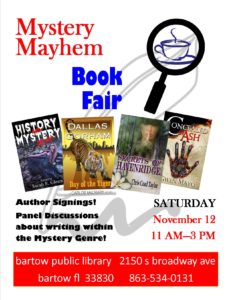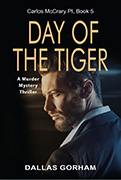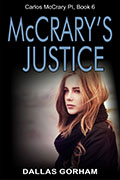Sneak Peak at Dallas Gorham’s Next Book: Echoes of War

I’m writing the first draft of my ninth Carlos McCrary mystery/thriller, tentatively titled Echoes of War.
The story opens with a body washing up on a deserted beach on Rockfish Key. The headless corpse has 777 tattooed on one arm. Could the murder victim be a former member of Chuck McCrary’s Triple Seven Special Forces unit? Chuck and his friend, Port City Police Captain Hidalgo “Hank” Ramirez, travel to the Port City Police Crime Lab to help identify the body.
This is the first time I’ve featured Chuck’s former Special Forces commander Hank Ramirez in a novel. You met Hank in “I’m No Hero,” my short story introducing Carlos McCrary when he was a sergeant in the Special Forces. I hope you’ll enjoy getting to know Hank better.
In Chapter 3 of Echoes of War Chuck and Hank Ramirez visit the Port City Police Crime Lab. I do a lot of research for my novels online, of course. To get a feel for how a big city crime lab operates, I found a fascinating video on YouTube entitled Inside the Crime Lab: A Complete Tour of the Denver Police Crime Laboratory. Click on the link if you’d like to see a twenty-six-minute tour of the Denver crime lab.
The autopsy scene and the crime lab scene will be realistic, but not gory. I keep my stories to a PG-13 rating and don’t create any scenes with images that will keep anyone up at night. It takes a deft touch to write this way, but—with help from my editor—we succeed.
I’ll keep you abreast of how Echoes of War is proceeding.
Book Signing at Leesburg Literary Arts Festival

I was one of 15 local writers invited by the Leesburg Library for their Leesburg Literary Arts Festival, part of the Leesburg Art Festival. I was there from 10 a.m. to 5 p.m. on March 10-11, meeting attendees at the Arts Fest and signing my books on Main Street in downtown Leesburg, Florida.
We were blessed with glorious weather and the crowd turnout was gratifying. I was also gratified by several art patrons who bought all seven of my Carlos McCrary novels. Response was so good that I sold out of three of the seven titles.
This is an annual event that I recommend and plan to attend again next year. It’s a fun weekend during a beautiful time of the year in central Florida that includes an impressive collection of literary genius, artwork, music and food.
Here are some links to information should you want to join me next year:
Literary Arts Festival Website
Leesburg Public Library Website
I hope to see you there!
Joel Goodman writes a terrific legal thriller
 Final Judgment by Joel Goldman
Final Judgment by Joel Goldman
My rating: 5 of 5 stars
Three plots for the price of one
A fascinating story of coercion, blackmail, and murder. Lou Mason’s heart is in the right place, but sometimes he has to bend the rules to the breaking point. A compromised judge forces Mason to help her clear her name. Then aging con man wants Mason to negotiate a plea bargain. Things get complicated when a headless body turns up. Lou Mason is up to his eyeballs in trouble. You won’t want to put this one down until you finish it. As a mystery/thriller writer myself, I appreciate the skill with which Joel Goldman constructs this enjoyable novel.
New Five-Star Review makes my day

A mystery solved though clues!, February 15, 2017
By
Verified Purchase(What’s this?)
This review is from: Double Fake, Double Murder (A Carlos McCrary, Private Investigator, Mystery Thriller Series Book 2) (Kindle Edition)
Chuck McCrary is ex-police and now a private investigator and he gets a case – an old friend, Jorge, from his police days has been charged with murder. The problem is, the evidence seems to be overwhelming. He was patrolling in the crime area just after midnight, the victim was a known drug dealer that all the police hated, Jorge had previously admitted that his gun had never left his possession, and the bullet that killed the victim came from Jorge’s gun. I must confess when I got this far I was feeling somewhat depressed. There was no reasonable way for Jorge not to be found guilty, short of some deus ex machina type solution. But Chuck soldiers on, and does some normal police work that seems to get nowhere with his real case, then he gets accused of murdering one of the suspects. Hidden in amongst all this is the odd clue, for those who really appreciate mysteries. Meanwhile, Chuck has also found a witness, except that in the dark he did not see much, and worse, he is a run-away kid for whom the system has failed. Jorge’s lawyer merely wants to plea bargain; being a public defender, she is overworked. Thus the public defence and the social services for children who are more or less abandoned by their parents are examined, and found wanting. Then, as you might guess, Chuck solves the crime, but to my pleasant surprise, the whole thing ended up quite reasonable, the crime was solved in an orthodox way without silly confessions but by putting together clues. Not only that, but it is well written. As mysteries go, this is way up with the best, and, as I noted, there is a social commentary relating to those for whom life has not been kind as an added extra. Highly recommended.
Lee Child has another winner Night School: A Jack Reacher Novel #LeeChild
 Lee Child is what a thriller writer should be. He’s imaginative, articulate, persuasive, and, best of all, entertaining. Reading any of Lee Child’s books is a great way to spend a few hours. I bought “Night School” at a book store in hard bound because I keep all of Lee’s books in my personal library. “Night School” is a “prequel” to Jack #Reacher as an ex-military cop in that it takes place while Reacher was still in the US Army in the late 1990s. I don’t want to spoiler the dynamite ending, so I’ll say that I loved it. After I finished it, I loaned it to a friend who has read all the Jack Reacher novels also, and she said it was her favorite Reacher novel–the best that Lee Child has ever written. I can’t say that because they are ALL excellent.
Lee Child is what a thriller writer should be. He’s imaginative, articulate, persuasive, and, best of all, entertaining. Reading any of Lee Child’s books is a great way to spend a few hours. I bought “Night School” at a book store in hard bound because I keep all of Lee’s books in my personal library. “Night School” is a “prequel” to Jack #Reacher as an ex-military cop in that it takes place while Reacher was still in the US Army in the late 1990s. I don’t want to spoiler the dynamite ending, so I’ll say that I loved it. After I finished it, I loaned it to a friend who has read all the Jack Reacher novels also, and she said it was her favorite Reacher novel–the best that Lee Child has ever written. I can’t say that because they are ALL excellent.My first 5-star review for McCrary’s Justice
Top Customer Reviews
I’m appearing at Mystery Mayhem book fair in Bartow, Florida

I’m delighted to be one of the authors appearing at the Bartow Mystery Mayhem Book Fair on Saturday, November 12. I’ll be talking about the business of writing and answering questions about the art and craft of writing. This will also be the first public appearance of my new book McCrary’s Justice.
Is there a gender point of view?
 A couple of days ago I finished the draft of my sixth Carlos McCrary novel McCrary’s Justice. In it, I wrote several chapters from the POV (point of view) of the girlfriend (later fiancé) of Carlos McCrary. Since I have never written from the POV of a woman, I asked several of my writer friends (most of whom were female) to read the chapters and call to my attention any glaring errors.
A couple of days ago I finished the draft of my sixth Carlos McCrary novel McCrary’s Justice. In it, I wrote several chapters from the POV (point of view) of the girlfriend (later fiancé) of Carlos McCrary. Since I have never written from the POV of a woman, I asked several of my writer friends (most of whom were female) to read the chapters and call to my attention any glaring errors.
David Bishop, www.davidbishopbooks.com, sent me what I can only describe as an essay on gender in writing:
“Two things without even reading the pages.
“First, I am not qualified to read and comment on anything from the female POV—I’m male.
“Second, I don’t accept there is any such thing as a female POV. To accept there is, even in theory, implies the acceptance that there is a singular female POV. If there was, it means that each female thinks, decides, and acts in the same manner as all other females. If this is not true, then there is no female POV.
“In my life (my only arena of knowledge) I have found women to have as varied and diverse a POV as do men. We sometimes hear and read (in reviews sometimes) that the author has or has not captured the women’s POV. For me this means, that the individual woman writing that comment finds what she read to be inconsistent with how she individually would act or react to the stimulus that exists in the story. That woman thereby aggrandizes her POV on whatever as the POV of women.
“For me, the relevant question is: Could a woman (not any individual one or even a majority of women) behave in the manner the fictional female character behaves in the story? If the answer is yes, then what the author has that woman character do is plausible. If the answer is no, then the author has written a character who fails in believability–whether that character is female or male.
“My view is: Women are diverse, so don’t get bogged down in the limitation of some fantasy about an overriding women’s POV. Some ladies have sex on the first date, others are nuns. Some ladies scream at a shadow, while others kick the guy in the nuts and slap him silly. Some women work as teachers, while others have sex with their underage students. Others drive a 16-wheeler on the open road rather than wait tables at Denny’s. Some use the “F” word and some don’t. Etc.
“Write your women to be plausible. Could a woman act as your fictional one does? If yes, write it as such. Do that convincingly and most readers, male and female, will accept it. Those who will be critical because they have prescribed for all fictional woman a single POV–which always ends up being their individual POV–well, those folks will be critical of your/my/any author’s POV for females that clash with their own personal POV on whatever subject.
“For further comments, if desired, try female writers or female readers–which might be the better source to begin with. Ask them if they found the behavior of X female in the story to be within the realm of plausible female behavior. Putting it in those terms should let them know you aren’t asking if they endorse that behavior or would behave the same way. The core question is: Can they envision a woman doing whatever your fictional character did?
“I have every one of my stories read by three or four women before I consider them final manuscripts. Their backgrounds are quite different and they do it wonderfully. My stories always benefit from their input.
“Hoped this helped.”
Yes, David, it helped a great deal.
Judi Ciance, author of the Casey Quinby mysteries, was tied up for a couple of weeks. Nevertheless, she took the time to email me back:
“You don’t have to think as a woman per se; think like the character you’re creating. This might be hard, and it might take several rewrites. You remember my Doll Murders. The main character is Detective Mike Mastro. I try to think and act like his character would, to use a voice he and his environment would expect. If that requires edgy language, then so be it. My book isn’t fluff; it’s about a serial murderer, so Detective Mastro isn’t going to be a Casey Quinby type. I suggest you look at some books written by women whose main character(s) are men. But because of the violence you depict, make sure you select an author who writes along the same lines.”
Well said, Judi.
What do you think? Is there a distinct “women’s point of view”?
Novelist risks life because he forgot to backup his work
 Gideon Hodge, a 35-year-old novelist, playwright, and actor, sprinted past New Orleans firefighters into a burning to save his laptop. He had stored two completed novels on the computer. “Anybody that’s ever created art, there’s no replacing that,” he told The New Orleans Advocate after he made it out of the burning building safely. “It’s got pretty much my life’swork.”
Gideon Hodge, a 35-year-old novelist, playwright, and actor, sprinted past New Orleans firefighters into a burning to save his laptop. He had stored two completed novels on the computer. “Anybody that’s ever created art, there’s no replacing that,” he told The New Orleans Advocate after he made it out of the burning building safely. “It’s got pretty much my life’swork.”
While I admire Hodge’s dedication to his work, I wonder about his common sense. No backup?
I use Carbonite, which automatically backs up every working file on my computer every day. It costs $59.99 a year for the basic service–cheap when compared to risking your life.
Does coffee help creativity?
 I remember a scene from an old television show. The Darren McGavin, playing private investigator Mike Hammer, met his client in a coffee shop. He had met her at a coffee shop each time he had something to report. Each time he ordered coffee. Finally, her curiosity got the best of her and she asked, “How much coffee do you drink every day?”
I remember a scene from an old television show. The Darren McGavin, playing private investigator Mike Hammer, met his client in a coffee shop. He had met her at a coffee shop each time he had something to report. Each time he ordered coffee. Finally, her curiosity got the best of her and she asked, “How much coffee do you drink every day?”
He answered, “Fifteen or twenty cups.”
The client said, “Doesn’t it keep you awake?”
Our hero said, “It helps.”
I’m like Honoré de Balzac, the early 19th century French author, who said (translated by Robert Onopa): Coffee is a great power in my life… [It] sets the blood in motion and stimulates the muscles; it… chases away sleep, and gives us the capacity to engage a little longer in the exercise of our intellects.
Balzac is said to have drunk up to 50 cups a day, although his cups were much smaller than today’s mugs. Best-selling author Lee Child reportedly drinks 30 cups a day.
Compared to these writers, my coffee habit is modest. I am usually at my desk by 8:00 a.m., having risen at 5:30, read three newspapers, and breakfasted with my wife. My first cup of breakfast coffee is the normal high-octane stuff to knock the cobwebs off my brain. Years ago a doctor told me after a routine physical that too much caffeine is bad for people, so for the rest of the day I restrict caffeine to times when the cobwebs come back.
After working in my study until about 9:30, I start to feel the cobwebs lurking in the far corners of my mind. Bang! Back to high-octane coffee—only now, I switch to iced coffee. Over the rest of the day, I’ll have three more iced coffees, occasionally four or five.
I discovered iced coffee in 2004 after Hurricane Frances.
11:00 p.m. Saturday, September 4. 2004, Labor Day weekend: Hurricane Frances moved ashore in Martin County, Florida with sustained winds over 100 mph. The eye passed directly over our house, knocking our two-story screened enclosure into our swimming pool. Fortunately, our townhouse was built to the stronger building codes adopted after Hurricane Andrew hit south Florida in 1992. Our home was otherwise intact. Even with underground utilities, our neighborhood electric power was knocked out for four days. (Which is one reason we now live in Lake County, Florida. But that’s another story.) My wife and I had evacuated to Georgia and returned to find our town in need of help.
I am a Volunteer Minister for the Church of Scientology and we worked with the National Guard and the Red Cross to hand out food and water to long lines of victims. The temperature was over 90 degrees in early September with humidity match. Three o’clock in the afternoon, after working in the sun since early morning, I was dissolving into a puddle of sweat and grime. Miraculously, an angel of rescue appeared in the form of a Dunkin’ Donuts panel truck. The Dunkin’ truck pulled into the shopping center parking lot where we were handing out water and ice. The back of the truck was full of huge containers of iced coffee for the volunteers. One sip of that delicious Dunkin’ Donuts iced coffee and I felt like I’d had a two-hour nap in an air-conditioned room. It was almost better than sex. Almost.
Ever since then, I’m a big iced-coffee fan.










